

Downloads. What can I do with my degree in geology? As a geology graduate, your expertise in undertaking field and laboratory investigations combined with your teamworking, communication and analytical skills make you an attractive prospect for many employers...

Job options Jobs directly related to your degree include: Jobs where your degree would be useful include: Remember that many employers accept applications from graduates with any degree subject, so don't restrict your thinking to the jobs listed here. To find out what jobs would suit you, log in to My Prospects. Work experience Fieldwork in both the UK and overseas is a key part of geology courses as it provides practical experience.
Career Paths: Earth and Environment. Placements. Relevant work or volunteering experience can help you decide where you want to be in future, and also shows potential employers that you are committed to a geoscience career.
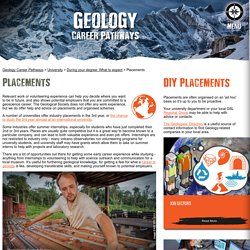
The Geological Society does not offer any work experience, but we do offer help and advice on placements and organised schemes. A number of universities offer industry placements in the 3rd year, or the chance to study the 3rd year abroad at an international university. Some industries offer summer internships, especially for students who have just completed their 2nd or 3rd years. Places are usually quite competitive but it is a great way to become known to a particular company, and can lead to both valuable experience and even job offers. Careers in the Earth sciences. Introduction There is a wide range of career opportunities open to geology graduates, for example within the hydrocarbons, mining and quarrying and civil engineering industries; government and government supported scientific establishments, geological surveys, specialist geological consultants and research companies, and teaching.
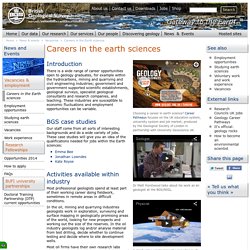
These industries are susceptible to economic fluctuations and employment opportunities can be variable. BGS case studies Our staff come from all sorts of interesting backgrounds and do a wide variety of jobs. These case studies will give you an idea of the qualifications needed for jobs within the Earth sciences: Activities available within industry Most professional geologists spend at least part of their working career doing fieldwork, sometimes in remote areas in difficult conditions.
Most oil firms have their own research labs which provide analytical services and theoretical analysis, for example to improve the ways of predicting where oil may be found. The Geological Society. Geologists. A typical geologist, or someone interested in geology as a career, will be interested in travel and working outdoors, have a passion for nature, and how things work, and are interested in the environment, and the issues facing it.
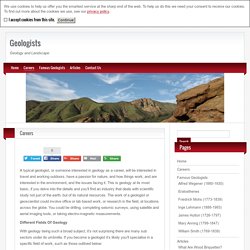
This is geology at its most basic, if you delve into the details and you’ll find an industry that deals with scientific study not just of the earth, but of its natural resources. The work of a geologist or geoscientist could involve office or lab based work, or research in the field, at locations across the globe. You could be drilling, completing seismic surveys, using satellite and aerial imaging tools, or taking electro-magnetic measurements. Different Fields Of Geology With geology being such a broad subject, it’s not surprising there are many sub sectors under its umbrella. You could work in environmental geology, a fast growing field that studies threat to the environment, and looks at developing solutions to environmental problems. Earthwork_leaflet.pdf.
American Geosciences Institute. AGI has developed a resource for students, teachers and faculty that explains the types of job opportunities for geoscientists.
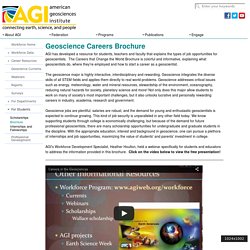
The Careers that Change the World Brochure is colorful and informative, explaining what geoscientists do, where they're employed and how to start a career as a geoscientist. The geoscience major is highly interactive, interdisciplinary and rewarding. Geoscience integrates the diverse skills of all STEM fields and applies them directly to real world problems. Bham Uni ethics talk 2011. The Geological Society. PlanIT Plus - Career Zone. This site uses some unobtrusive cookies to store information on your computer.
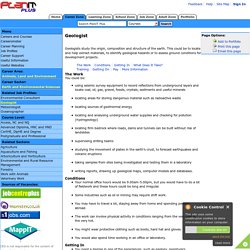
Some cookies on this site are essential, and the site won't work as expected without them. These cookies are set when you submit a form, login or interact with the site by doing something that goes beyond clicking on simple links. We also use some non-essential cookies to anonymously track visitors or enhance your experience of the site. If you're not happy with this, we won't set these cookies. To control third party cookies, you can also adjust your browser settings. By using our site you accept the terms of our Privacy Policy. (One cookie will be set to store your preference) (Ticking this sets a cookie to hide this popup if you then hit close. About this tool About Cookie Control. PlanIT Plus - Career Zone. This site uses some unobtrusive cookies to store information on your computer.
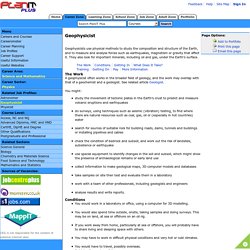
Some cookies on this site are essential, and the site won't work as expected without them. These cookies are set when you submit a form, login or interact with the site by doing something that goes beyond clicking on simple links. We also use some non-essential cookies to anonymously track visitors or enhance your experience of the site. Society for Underwater Technology.
Marine geological sciences include those activities involving in studying the earth beneath the seabed.
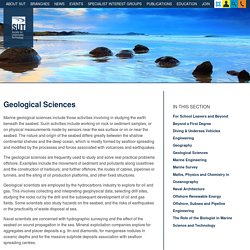
Such activities include working on rock or sediment samples, or on physical measurements made by sensors near the sea surface or on or near the seabed. The nature and origin of the seabed differs greatly between the shallow continental shelves and the deep ocean, which is mostly formed by seafloor spreading and modified by the processes and forces associated with volcanoes and earthquakes. The geological sciences are frequently used to study and solve real practical problems offshore.
Examples include the movement of sediment and pollutants along coastlines and the construction of harbours; and further offshore, the routes of cables, pipelines or tunnels, and the siting of oil production platforms, and other fixed structures. Geological scientists are employed by the hydrocarbons industry to explore for oil and gas. DaviesCVAdvice. Overview of the engineering and manufacturing sector in the UK. Engineers are in demand and over the next few years there will be 1.86 million vacancies that require engineering skills What areas of engineering and manufacturing can I work in?

There are a range of industries to consider: The Geological Society. Job Resources & News.